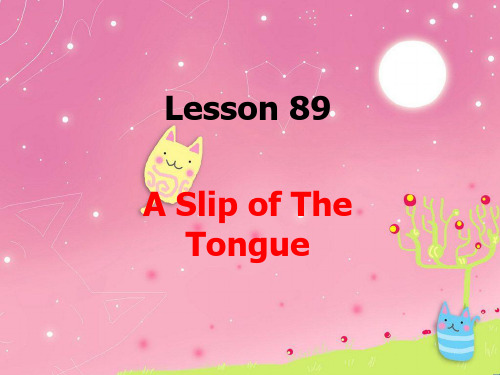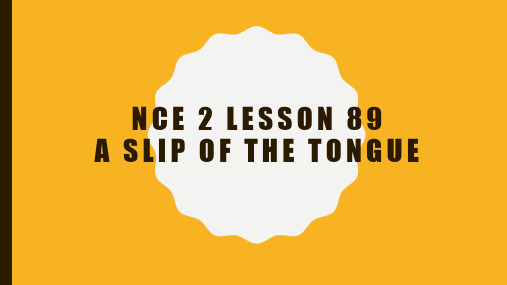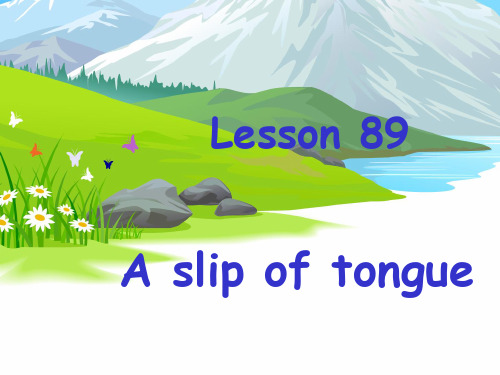(完整版)新概念英语第二册:Lesson89课文注释
新概念英语第二册89课

Keys
1.D 2.C 3.A 4.C 5.B 6.B
典型例题
3.He paid for a seat, when he ______ have entered free. A. could B. would C. must D. need
典型例题
4.I didn’t see her in the meeting room this morning. She ______ at the meeting . A. mustn’t have spoken B. mightn’t have spoken C. can’t have spoken D. shouldn’t have spoken
advertiser
comedy
dull
artiste
tragedy
queue
Watch the video
D289(流畅).f4v 1.What would be presented at our local cinema? 2.How was the show? 3.Who did not come? 4.What was the only funny thing?
Lesson 89 A Slip of The Tongue
New words and expressions
slip n. 小错误 comedy n. 喜剧 present v. 演出;adj. 出席,到场的 queue v. 排队 dull adj. 枯燥,无味 artiste n. 艺人 advertiser n. 报幕员
经典例题
Mr. White _____ at 8:30 for the meeting , but he didn’t’ show up. A. should have arrived B. should arrive C. should have had arrived D. should be arriving
新概念第二册-Lesson 89 A slip of the tongue

the poor man should have said, but what he actually said was: 'This is 实际已经做来。
the Poo and Ee Seed Bird Company. Good ladies, evening and
gentlemen!"
GRAMMAR REVIEW: 时间状语从句
beginning of the programme. He was obviously very nervous and for 要感到失望。
some minutes stood awkwardly before the microphone. As soon as need后接不定式的完成
he opened his mouth, everyone burst out laughing. We all know what 式表示不必做某事而
参考译文 - A SLIP OF THE TONGUE 口误
人们总要想尽办法看不花钱的演出——哪怕是拙劣的演出。当“皮尤” 鸟食公司将在我们当地影院演出喜剧节目的消息传开后,我们都赶紧 跑去观看。我们不得不排了好几个小时才进得场去。在演出开始前场 内肯定已有好几百人了。不幸的是,这次演出是我们看过的最乏味的 演出了。那些没能进到场内的人没有必要感到失望,因为很多应该出 场的专业演员都没有来。那天晚上唯一有趣的事情是节目开始时那个 报幕员的开场白。他显然非常紧张,局促不安地在麦克风前站了好几 分钟。但他刚一开口说话,人们便哄堂大笑起来。我们都明白那个可 怜的人应该说些什么,而他实际说的却是:“这是‘浦伊’鸟食公司, 好女士们,晚上和先生们!”
COMEDY
comedy /ˈkɒmədi/ n. 喜剧, ;幽默 a TV comedy series 电视喜剧连续剧 -柯林斯高阶英语词典 E.g. He performs standup comedy every Saturday. 他每周六表演单口相声。 E.g. At last he saw the comedy of the situation and laughed. 他最后看出这一场面的喜剧性, 于是笑了. -《简明英汉词典》
新概念第二册Lesson 89 A slip of the tongue讲义

新概念第二册Lesson 89 A slip of the tongue一、单词精讲slip[slip] n.小错误引申:可引申为小失误、疏漏,在行为或言语上不经意出现的小差错。
例如:a slip of the tongue(口误,舌头的小失误)。
搭配:make a slip(犯小错误);a slip - up(小差错,失误)例句:He made a slip in his calculation.(他在计算中犯了一个小错误。
)comedy ['kɔmidi] n.喜剧引申:可引申为具有喜剧性、幽默诙谐的事件或情况。
例如:The whole situation was a comedy of errors.(整个情况是一出错误百出的喜剧。
)搭配:comedy show(喜剧表演);comedy film(喜剧电影);black comedy (黑色喜剧,一种以荒诞、讽刺为特点的喜剧形式)。
例句:We watched a really funny comedy last night.(我们昨晚看了一部非常有趣的喜剧。
)present[pri'zent, 'prezənt] v.演出a.出席,到场的搭配:v.演出引申可引申为展示、呈现(某种艺术形式或表演内容)。
例如:The theater will present a new play next month.(剧院下个月将演出一部新剧。
)v.演出搭配present a performance(进行一场演出);present a concert(举办一场音乐会)。
v.演出例句They will present a magic show tonight.(他们今晚将表演一场魔术秀。
)a.出席,到场的引申可引申为存在的、当前的(表示在某个特定的场合或时间是存在或出现的)。
例如:All present members should vote.(所有在场的成员都应该投票。
(完整版)新概念英语第二册笔记-第89课

Lesson 89 A Slip of The Tongue 口误【Text】People will do anything to see a free show -- even if it is a bad one. When the news got round that a comedy show would be presented at our local cinema by the P. and U. Bird Seed Company, we all rushed to see it. We had to queue for hours to get in and there must have been several hundred people present just before the show began. Unfortunately, the show was one of the dullest we have ever seen. Those who failed to get in need not have felt disappointed, as many of the artists who should have appeared did not come. The only funny things we heard that evening came from the advertiser at the beginning of the program. He was obviously very nervous and for some minutes stood awkwardly before the microphone. As soon as he opened his mouth, everyone burst out laughing. We all know what the poor man should have said, but what he actually said was: 'This is the Poo and Ee Seed Bird Company. Good ladies, evening and gentlemen!"【课文翻译】人们总要想尽办法看不花钱的演出——哪怕是拙劣的演出。
新概念英语第二册:Lesson89 课文注释

新概念英语第二册:Lesson89 课文注释【篇一】A slip of the tongue,(标题)说走了嘴,失言。
slip在这里表示“不经心的错误”、“失误”、“疏漏”:Youve made some slips (of the pen) in your report.你的报告中有一些小错(笔误)。
When he was nervous, he would sometimes make a slip of tongue.当他紧张时,他有时就会发生口误。
Are you sure that it was just a slip of tongue?你确信那仅仅一时口误吗?【篇二】People will do anything to see a free show…人们总要想尽办法去看不花钱的演出……anything用于肯定句时表示“不论什么”、“任何事情”,to see a free show表示目的,也能够用for+名词形式:He will do anything to save his childs life.他要想尽办法挽救他孩子的生命。
He will do anything for the child.为了这孩子,他干什么都愿意。
【篇三】When the news got round that a comedy show would be presented at our local cinema by the P. and U. Bird Seed Company…当“皮尤”鸟食公司将在我们当地影院演出喜剧节目的消息传开后……(1)when引导的这个时间状语从句中含有一个同位语从句,即the news that…。
因为that引导的同位语从句较长,便与它所修饰的news隔开了,放在谓语动词之后,以免句子头重脚轻。
同位语从句中用了被动语态的过去将来时形式。
(2)get round在这里表示消息、谣言等“传开”(也能够用get around/about):The word soon got round that there was buried treasure in that cave.那个洞里有宝藏的消息很快便传开了。
新概念2第89课

Text-reading
People will do anything to see a free show -- even if it is a bad one.
anything用于肯定句时表示“不论什么,任何事情”,to see a free show 表 示目的,也可以用for +名词形式:
在英国,他经常会因跟别人说话的时的那些令人难堪的话语被嘲笑。
He once told the President of Nigeria, who was dressed in traditional clothes, “You look like you’re ready for bed。”
他曾经跟身着民族服饰的尼日利亚总统说:“你看起来正准备要去 睡觉。”
must have done对过去的肯定的猜测
如: It must have rained last night, for the ground is wet. You must have been mad to speak to the servant.
Those who failed to get in need not have felt disappointed, as many of the artistes who should have appeared did not come.
In 2004, he mistakenly suggested that he was out to harm h i s o w n c o u n t r y : “ O u r e n e m i e s a re i n n o v a t i v e a n d resourceful, and so are we。 2004 年他有次口误竟说他伤害了他自己的国家:“我们的敌人是 革新和谋略,我们也是国家的敌人。
新概念第二册课文翻译及学习笔记【Lesson88、89、90】
新概念第二册课文翻译及学习笔记【Lesson88、89、90】【课文】First listen and then answer the question.听录音,然后回答以下问题。
Why is the rescue taking so long?Six men have been trapped in a mine for seventeen hours. If they are not brought to the surface soon they may lose their lives. However, rescue operations are proving difficult. If explosives are used, vibrations will cause the roof of the mine to collapse. Rescue workers are therefore drilling ahole on the north side of the mine. They intend to bring the men up in a special capsule. If there had not been a hardlayer of rock beneath the soil, they would have completed the job in a few hours. As it is, they have been drilling for sixteen hours and they still have a long way to go. Meanwhile, a microphone, which was lowered into the mine two hours ago, has enabled the men to keep in touch with their closest relatives. Though they are running out of food and drink, the men are cheerful and confident that they will get out soon. They have been told that rescue operations are progressing smoothly. If they knew how difficult it was to drill through the hard rock, they would lose heart.【课文翻译】6个人被困在矿井里已有17个小时了。
新概念第二册课文翻译及学习笔记【Lesson88、89、90】
新概念第二册课文翻译及学习笔记【Lesson88、89、90】新概念第二册课文翻译及学习笔记【Lesson88、89、90】【课文】First listen and then answer the question.听录音,然后回答以下问题。
Why is the rescue taking so long?Six men have been trapped in a mine for seventeen hours. If they are not brought to the surface soon they may lose their lives. However, rescue operations are proving difficult. If explosives are used, vibrations will cause the roof of the mine to collapse. Rescue workers are therefore drilling ahole on the north side of the mine. They intend to bring the men up in a special capsule. If there had not been a hard layer of rock beneath the soil, they would have completed the job in a few hours. As it is, they have been drilling for sixteen hours and they still have a long way to go. Meanwhile, a microphone, which was lowered into the mine two hours ago, has enabled the men to keep in touch with their closest relatives. Though they are running out of food and drink, the men are cheerful and confident that they will get out soon. They have been told that rescue operations are progressing smoothly. If they knew how difficult it was to drill through the hard rock, they would lose heart.【课文翻译】6个人被困在矿井里已有17个小时了。
(完整word版)新概念第二册Lesson89Aslipofthetongue口误
The news is now known that I heard in the city the day before yesterday.我前天在城里听到的那条消息大伙都知道了。
When the news got round that acomedyshow would bepresentedat our local cinema by the P。 and U. Bird Seed Company, we all rushed to see it。当“皮尤”鸟食公司将在我们当地影院演出喜剧节目的消息传开后,我们都赶紧跑去观看。
The examiner must have been pleased with my performance。主考人对我的表现想必是满意的.
You needn’t have said that.你没必要这么说(实际上已经说了.)
You needn’t have told him about my plan.你本不必把我的打算告诉他。(实际上已告诉了他)虚拟语气
comic:形容词:喜剧的,连环画的
present[pri’zent, ’prezənt] v。演出a.出席,到场的
get around=get round/about:在这里表示消息、谣言等“传开"
The word soon got round that there was buried treasure in that cave.那个洞有宝藏的消息很快便传开了。
Ithought there was something funny about the parcel, soIphoned the police.
新概念英语第二册笔记第89课复习课程
新概念英语第二册笔记第89课复习课程学习-----好资料Lesson 89 A Slip of The Tongue 口误【Text】People will do anything to see a free show -- even if it is a bad one. When the news got round that acomedy show would be presented at our local cinema by the P. and U. Bird Seed Company, we allrushed to see it. We had to queue for hours to get in and there must have been several hundredpeople present just before the show began. Unfortunately, the show was one of the dullest we haveever seen. Those who failed to get in need not have felt disappointed, as many of the artists whoshould have appeared did not come. The only funny things we heard that evening came from theadvertiser at the beginning of the program. He was obviously very nervous and for some minutesstood awkwardly before the microphone. As soon as he opened his mouth, everyone burst outlaughing. We all know what the poor man should have said, but what he actually said was: 'This is thePoo and Ee Seed Bird Company. Good ladies, evening and gentlemen!【课文翻译】人们总要想尽办法看不花钱的演出——哪怕是拙劣的演出。
- 1、下载文档前请自行甄别文档内容的完整性,平台不提供额外的编辑、内容补充、找答案等附加服务。
- 2、"仅部分预览"的文档,不可在线预览部分如存在完整性等问题,可反馈申请退款(可完整预览的文档不适用该条件!)。
- 3、如文档侵犯您的权益,请联系客服反馈,我们会尽快为您处理(人工客服工作时间:9:00-18:30)。
新概念英语第二册:Lesson89 课文注释
【篇一】
A slip of the tongue,(标题)说走了嘴,失言。
slip在这里表示“不经心的错误”、“失误”、“疏漏”:
Youve made some slips (of the pen) in your report.
你的报告中有一些小错(笔误)。
When he was nervous, he would sometimes make a slip of tongue.
当他紧张时,他有时就会发生口误。
Are you sure that it was just a slip of tongue?
你确信那仅仅一时口误吗?
【篇二】
People will do anything to see a free show…人们总要想尽办法去看不花钱的演出……
anything用于肯定句时表示“不论什么”、“任何事情”,to see a free show表示目的,也能够用for+名词形式:
He will do anything to save his childs life.
他要想尽办法挽救他孩子的生命。
He will do anything for the child.
为了这孩子,他干什么都愿意。
【篇三】
When the news got round that a comedy show would be presented at our local cinema by the P. and U. Bird Seed Company…当“皮尤”鸟食公司将在我们当地影院演出喜剧节目的消息传开后……
(1)when引导的这个时间状语从句中含有一个同位语从句,即the news that…。
因为that引导的同位语从句较长,便与它所修饰的news隔开了,放在谓语动词之后,以免句子头重脚轻。
同位语从句中用了被动语态的过去将来时形式。
(2)get round在这里表示消息、谣言等“传开”(也能够用get around/about):
The word soon got round that there was buried treasure in that cave.
那个洞里有宝藏的消息很快便传开了。
Bad news gets round quickly.
坏消息传得快。
【篇四】
…there must have been several hundred people present just before the show began.……在演出开始前场内肯定已有好几百人了。
Those who failed to get in need not have felt disappointed, as many of the artistes who should have appeared did not come.
那些没能进到场内的人没有必要感到失望,因为很多应该出场的专业演员都没有来。
must+have+过去分词表示对过去发生的事实行推测(其否定式为cant+have+过去分词,cf.第17课语法);need+have+ 过去分词表示过
去不必做但实际已做了的事(cf.第41课语法);should/ought
to+have+过去分词表示本来应该做而实际未做的事(cf.第65课语法):
He had found five empty whisky bottles which the ghost must have drunk the night before.
他发现了5只空的威士忌酒瓶子,这肯定是鬼魂前天晚上喝的。
The examiner must have been pleased with my performance.
主考人对我的表现想必是满意的。
You neednt have said that.
你没必要这么说。
(实际已经说了)
You neednt have told him about my plans.
你本不必把我的打算告诉他。
(实际上已告诉了他)
He should have gone along a side street.
他应该走一条小街。
(实际上他走了主要街道)
【篇五】
As soon as he opened his mouth, everyone burst out laughing.
但他刚一开口说话,人们便哄堂大笑起来。
burst out为固定短语,其含义之一为“突然……起来”,后面
通常接动名词,也能够接in/into+名词:
At the sight of the drunk, everyone burst out
laughing/in laughter.
一看见那醉汉,大家便大笑起来。
When she heard that her father had died in the accident, she burst out crying.
当她听说她父亲在那次事故中丧生时便大哭起来。
【篇六】
We all know what the poor man should have said, but what he actually said was…
我们都明白那个可怜的应该说些什么,而他实际说的却是……
用should+have+过去分词表示过去理应做而并没有做的事时,它后面经常跟but(actually)以形成对比:
I should have left home before 9 oclock, but actually I didnt.
我本该在9点以前离开家,但实际上我没有。
You should have written the word‘too’, but what you actually wrote was‘to’.
你本该写“too”,但实际上你却写了“to”。
